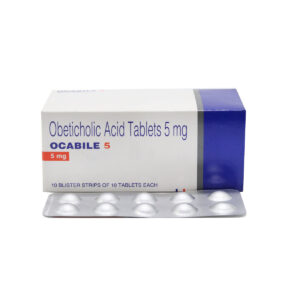OBETICHOLIC ACID
OBETICHOLIC ACID: Obeticholic acid is a medication primarily used to treat a liver condition called primary biliary cholangitis (PBC). It may also be used off-label for the treatment of non-alcoholic steatohepatitis (NASH) in certain cases.
The mechanism of action of obeticholic acid involves activating the farnesoid X receptor (FXR) in the liver and intestines. FXR activation helps to reduce the levels of bile acids in the liver, which can accumulate and cause damage in patients with PBC. By reducing the levels of bile acids, this drug helps to improve liver function and slow down the progression of the disease.
The recommended dose of obeticholic acid for PBC is 5 mg taken orally once daily. For NASH, the recommended dose is 25 mg taken orally once daily. It is important to follow the prescribed dosage and directions provided by your healthcare provider.
Some common side effects of obeticholic acid include itching, fatigue, abdominal pain, diarrhea, nausea, and joint pain. These side effects are usually mild to moderate in severity and tend to improve over time. However, if any severe or persistent side effects occur, it is important to seek medical attention.
It is worth noting that obeticholic acid may increase the risk of serious liver injury in some patients. Therefore, regular monitoring of liver function is essential during treatment. Additionally, this drug should be used with caution in patients with severe liver impairment or in certain other medical conditions, so it is important to discuss your medical history with your healthcare provider before starting treatment.
Overall, obeticholic acid is a medication that effectively helps manage PBC and shows potential for treating NASH, but it should be used under medical supervision due to potential side effects and the need for close monitoring.

